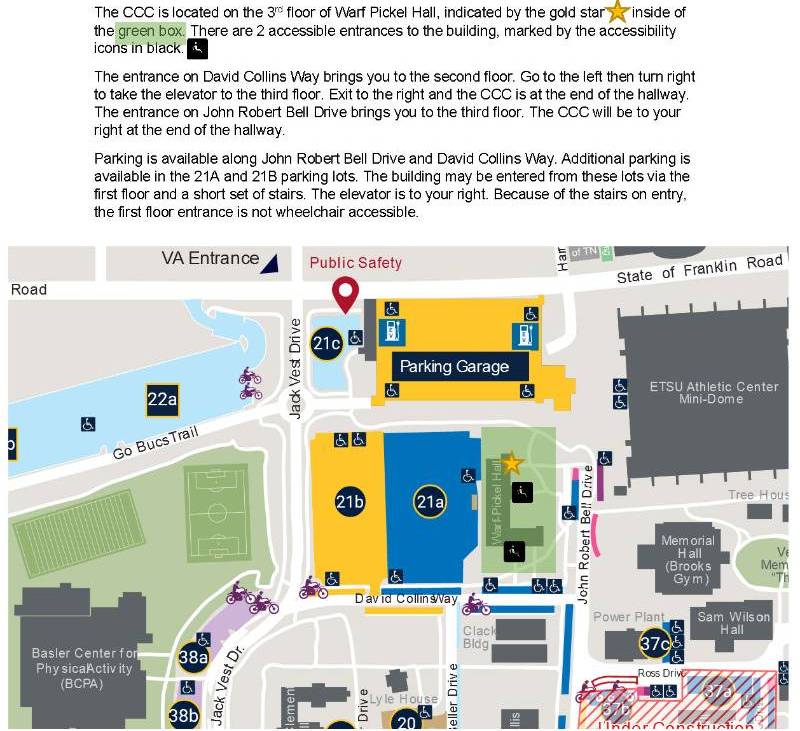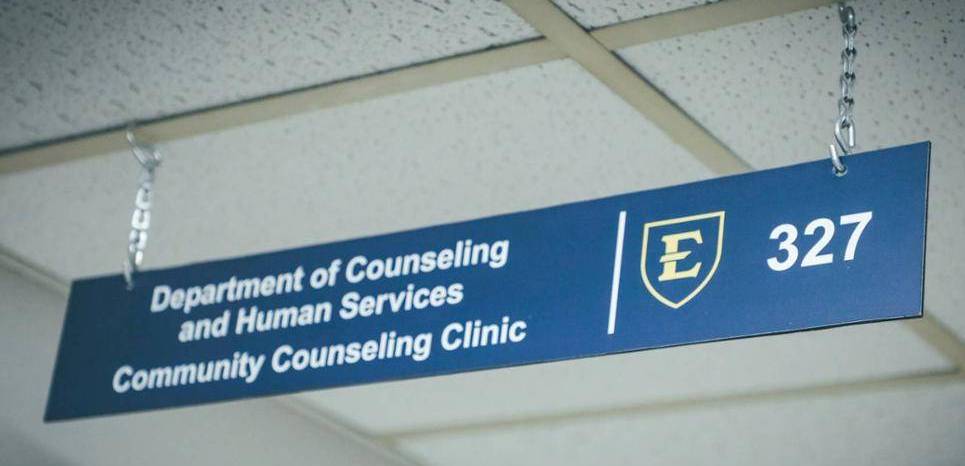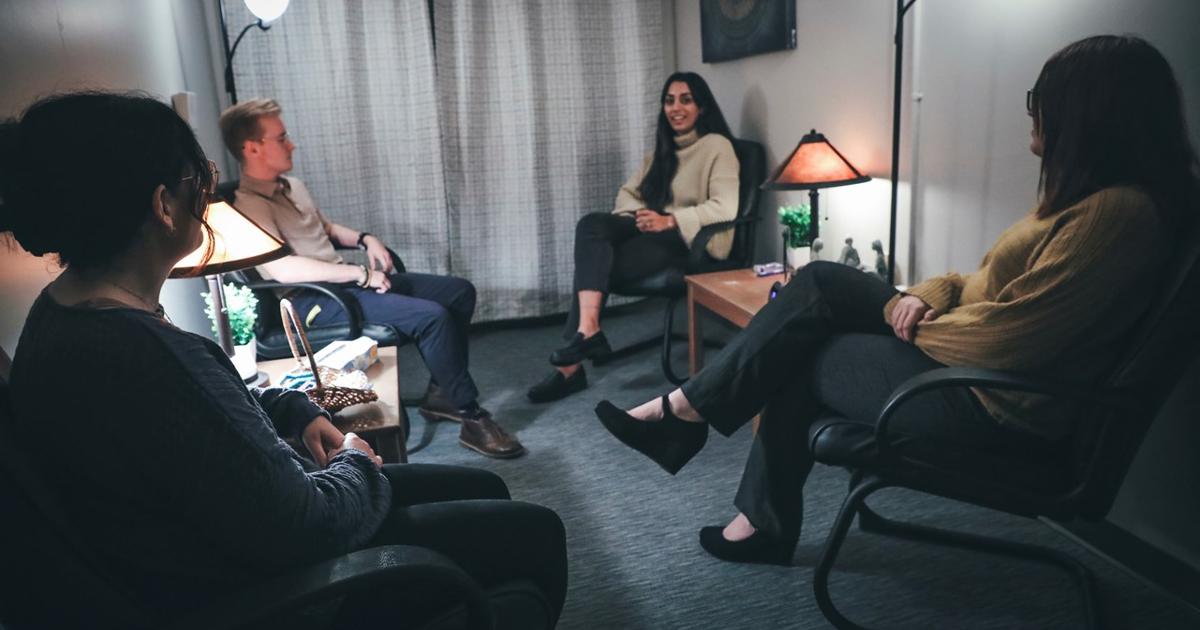If you are experiencing a life-threatening emergency, please call 911. If you’re experiencing a NON-life-threatening mental health crisis or emotional distress, please call 988, available 24/7, to speak with a trained crisis counselor.
Welcome to the CCC!
The Community Counseling Clinic (CCC) is a training clinic within the Department of Counseling and Human Services at East Tennessee State University. At the CCC, we offer professional mental health services provided by counselors-in-training under the supervision of licensed and doctoral-level Counseling Faculty. The CCC is dedicated to serving the community through compassionate care and evidence-based practices, ensuring that clients receive high-quality counseling while supporting the development of future professional counselors.
The CCC is committed to inclusivity. We do not engage in discrimination based on age, color, size, culture, ability, ethnicity, race, gender identity, religion, sexual/affectional orientation, marital status, veteran status, socioeconomic status, or other group membership or identity.
-
CCC’s Mission Statement
The CCC’s mission is to provide quality services based on best practices to the community while providing hands-on supervised experiences for our students. -
Eligibility for CCC’s Services
The CCC provides free counseling services to both community members and ETSU affiliates. We offer individual counseling for adults, adolescents, and children, along with couples and family counseling conducted by our counselors-in-training. Additionally, we occasionally offer group counseling.
There are no limits on the number of counseling sessions that individuals and families may attend. As our counselors-in-training progress towards graduation, clients may work with more than one counselor depending on the duration of their treatment.
-
CCC’s Service Limitations
As a training clinic, the CCC does not provide 24-hour emergency services, care for individuals needing inpatient treatment, or services mandated by court orders. If an individual requires more intensive care than we can offer, we will refer them to an appropriate agency for assistance.
Specifically, ETSU’s CCC does not provide services to the following:
Individuals currently experiencing severe or acute symptoms such as paranoia, hallucinations, or delusions.- Individuals currently in active addiction or struggling with an eating disorder.
- Individuals who have had suicidal or homicidal thoughts or behaviors in the past 6 months.
- Individuals, couples, or families requiring forensic analysis.
- Individuals, couples, or families requiring formal assessments or evaluations, formal diagnosis, formal functional status and/or prognosis, session documentation, or testimony for any legal or employment purposes.
- Minors 17 and under will not receive services unless the person(s) legally responsible for their care consents to treatment.
- Individuals currently receiving counseling elsewhere will not be seen at the CCC, with some exceptions for couples and family counseling.
- Students enrolled in the ETSU counseling program and their immediate family members
or partners.
Note: The CCC is not responsible for children accompanying clients during counseling sessions.
-
Concerns Commonly Addressed
- Adjustment to life changes
- Anxiety
- Career exploration
- Communication skills
- Coping skills
- Depression
- Discrimination
- Grief and loss
- Interpersonal relationships
- Self-exploration
- Stress management
-
Confidentiality
As a training clinic, all sessions are recorded to support student growth and development. Recordings are deleted at the end of each semester. ETSU’s CCC follows all relevant state laws, HIPAA, FERPA, and the American Counseling Association’s Code of Ethics. Information shared during counseling sessions is confidential with a few limitations. Counselors are legally required to report the following:
- Evidence or reports of child abuse or neglect.
- Abuse or neglect of vulnerable adults.
- Threats of harm to oneself or others.
- Reports of terrorism or imminent danger to public safety.
- Counselors may be compelled by court orders, such as subpoenas signed by a judge, to disclose client information.
Information may be shared with other parties only with the client’s explicit written consent, which specifies what information can be shared and with whom.For information on requesting records, please contact the CCC’s Clinic Director via email at CCC@etsu.edu
-
Notice of Privacy Practices
For information about our privacy practices, please click here. -
CCC Staff
The CCC is overseen by a Clinic Director, supported by a Master's level graduate assistant (GA) and tuition scholar (TS). Our counseling services are provided by Counselors-in-Training under the supervision of licensed and doctoral-level Counseling Faculty. -
Contact / Set up an Appointment
To schedule an appointment, please call the clinic at 423-439-7679 and leave a message, or email us at CCC@etsu.edu. We will promptly return your message to answer any questions and provide information about our current services. Please be aware that we frequently maintain a waiting list. Prospective clients will be added to this list and contacted sequentially to arrange a brief phone intake. This phone intake helps us determine if the CCC can support your needs. -
Directions
We are located on the third floor of Warf-Pickel Hall, and our waiting room is in room 327. Please note that we do not have a receptionist. The waiting room is monitored by camera, so please have a seat and wait for your counselor-in-training to come get you to begin your counseling appointment. Below, you will find instructions on how to locate both the building and the CCC.

-
Frequently Asked Questions
How can counseling help me?
Counseling is most effective when clients actively engage and invest in the process. It provides a safe space to explore emotions and concerns without judgement. This fosters deeper self-awareness and understanding of behavioral patterns. Clients can learn coping and communication skills, along with strategies to manage stress, anxiety, or depression. They can also learn to identify and address challenges more effectively, gaining understanding and perspective. Counseling helps in setting realistic goals, supporting personal growth and enhanced clarity in navigating life’s challenges.Will I be seen by a student?
Yes, we are a training clinic where all clients are seen by students (AKA counselors-in-training) who are working towards graduation. These students are supervised by licensed and doctoral-level Counseling Faculty.Can I request a specific student or a student who holds specific beliefs or identities?
Specific counselors-in-training cannot be guaranteed but we will do our best to accommodate requests.How should I handle parking on campus?
ETSU enforces parking restrictions for designated faculty/staff and student parking spaces on weekdays from 7:30am to 4:30pm. Parking restrictions are not enforced after 4:30pm on weekdays, on weekends, and during university closures. Clients attending appointments before 4:30pm will receive a parking permit valid for the academic year in which they are being seen.What happens if I don’t have a parking permit for my first appointment and receive a parking citation?
Clients must follow ETSU’s appeal process for any parking citations received. To learn more about the appeal process, click this link.What are the CCC’s hours?
The CCC's Graduate Assistant (GA) and Tuition Scholar (TS) have varying work hours throughout the week. Counseling sessions are primarily scheduled in the late afternoons and evenings, with occasional appointments also available on Friday afternoons, depending on class scheduling.Are counseling sessions recorded? For what purpose?
Yes, as a training clinic, all sessions are recorded to support and facilitate student learning and professional development. Recordings are deleted at the conclusion of each semester.Is the CCC open on holidays or during inclement weather?
The CCC follows ETSU’s schedule, including university breaks, closures for holidays, and inclement weather. Clients can stay updated on inclement weather closures by checking ETSU’s website or local news and radio stations. Counseling services are not available during semester breaks, including between semesters and during Spring and Fall Break.What do I do if I’m sick or something comes up and cannot make it to my appointment?
We understand that life happens. Please contact us by phone 423.439.7679 or email CCC@etsu.edu at your earliest convenience to inform your counselor-in-training of your need to reschedule.Is there a no-show and/or cancellation policy?
Yes. The CCC may discontinue services for clients who have two or more no-shows* or three or more client cancellations in a semester. Cancellations made by counselors-in-training are not included in the three cancellations per semester limit. We can provide referrals to other agencies that may better accommodate those clients’ scheduling needs.*A no-show refers to a situation where a client misses a scheduled appointment without notifying the clinic or counselor-in-training beforehand.
Can I request services for someone I’m concerned about?
All individuals seeking counseling services through the CCC must personally contact our clinic themselves, except minors aged 17 and under, or individuals with a health care proxy, health care power of attorney, or conservatorship.What can I expect to pay for counseling at the CCC?
The CCC provides free counseling services to both community members and ETSU affiliates. Please note that there are limitations to our students’ scope of practice. Please see Eligibility for CCC’s Services and CCC’s Service Limitations for more information.

Please note that the Department of Counseling and Human Serivces's Community Counseling Clinic that is housed in 327 Warf-Pickel Hall is not to be confused with the University Counseling Services housed in the Culp Center. Although both services are available for university students and work in cooperation with each other, they are independent. The University Counseling Center is the formal counseling service offered to ETSU students by the university while the Community Counseling Clinic functions through the Graduate Counseling Program in the College of Health Sciences and is available to the general public also.
 Stout Drive Road Closure
Stout Drive Road Closure 